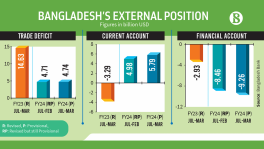Listed banks to pay 77% more cash dividends this year
The banks have declared to pay Tk2,260 crore in cash dividends from net profit of Tk7,050 crore in 2019

In spite of a historic low private sector credit growth, mounting nonperforming loans and a tighter credit disbursement environment, the listed banks together have delivered a moderate growth in the bottom line for 2019.
This has been possible largely because of the central bank that gave a hand to the banks in the form of relaxed provisioning, deferred recognition of nonperforming loans and the year-end loan rescheduling facilities approved for large borrowers.
More good news for the shareholders of the publicly-traded Bangladeshi banks is that they together are going to disburse 77% more cash dividends for 2019, compared to that of a year ago, according to a BRAC EPL Research report.
The analysts at the top-tier brokerage firm have compiled the most recently recommended dividends by the 30 listed banks. Of those, all but the struggling ICB Islamic Bank are paying dividends more or less, in cash or stock or a combination of both.
Nine of the banks have already completed their shareholders' annual general meetings and got their dividend plans approved. Some had to reduce dividends following the central bank's order to cap dividends in this year of the pandemic.
The BRAC EPL Stock Brokerage report reveals that listed banks have declared to pay Tk2,260 crore in cash dividends from their total net profit of Tk7,050 crore in 2019. In 2018, they had paid Tk1,280 crore in dividends out of their net profit of Tk6,180 crore.
The dividend pay-out ratio – the percentage of net profit paid out to shareholders – of the sector has grown to 32.1 from 18.8 a year ago.
The increased cash dividend is mainly an outcome of the Finance Act 2019.
The law dictates listed companies not to retain more than 70% of their specific year net profits alongside paying cash dividends at least equal to the stock dividends for the year if they want to avert a newly imposed 10% tax on retained profits or the amount of stock dividends.
The shareholder-friendly policy, already in effect, is helping investors get more dividends this year, and it is helping to increase confidence in the Bangladesh stock market, said Mehedee Hasan, BRAC EPL Stock Brokerage's assistant director working as a senior portfolio strategist.
Without the increased cash dividends, the banking sector might have to pay more tax on stock dividends or profit retention this year.
Against the paid-up capital, banks together are set to pay 7.5% cash dividends this year, which was 4.6% in the previous year.
On the other hand, average stock dividends – new share issuance against existing paid-up capital – came down to 3.9% from 7.9% a year ago.
The total cash dividends and the pay-out ratio would have gone even higher had the central bank not capped dividends for banks this year based on individual banks' capital adequacy.
The Bangladesh Banks' role
For the banks' capital strengthening to better serve the pandemic-hit economy, the Bangladesh Bank, through its May 11 circular, has capped a bank's total dividends for 2019 to up to 30%, of which cash cannot exceed 15% of the paid-up capital.
Banks with less than 12.5% capital adequacy ratio alongside 2.5% capital conservation buffer can disburse even less cash in dividends, and the weakest ones are not allowed to pay any cash dividends.
Analysing the Dhaka Stock Exchange data, Mehedee informed The Business Standard that the banking sector's market capitalisation has come down to Tk47,190 crore from Tk75,460 crore at the end of 2017.
Over the last two and a half years, listed banks' combined net asset value has gone up to Tk70,000 crore from less than Tk60,000 crore, he added.
The declined stock price now helped the banking sector yield five percent in this year's cash dividends, highest in four years, said Mehedee.
Across many parts of the world, a debate has emerged over dividend pay-outs in the year of the pandemic, especially from the banking sector.
Many banking regulators, like those in Europe and even neighbouring India, have put restrictions on banks' dividends so that banks remain strong with retained cashes to help the economy and its own financial base as well.
Bangladesh is not an exception.
However, the legacy of cultural differences to prefer stock dividends and its negative experience is drawing strong support for increased cash dividends from listed companies, especially among the capital market investors here.
Bangladesh Merchant Bankers' Association President Md Sayadur Rahman is hopeful that the increased dividends would help to revive investors' confidence further.
His association representing the country's investment banks has recently written to the central bank so that it pushes the commercial banks to disburse cash dividends for individual investors sooner.
The Bangladesh Bank, in May this year, initially ordered banks not to disburse cash dividends before October.
Based on requests from capital market groups conveyed by the Bangladesh Securities and Exchange Commission, the central bank later relaxed the restriction in case of individual investors who widely outnumber the institutional ones.


 Keep updated, follow The Business Standard's Google news channel
Keep updated, follow The Business Standard's Google news channel
















